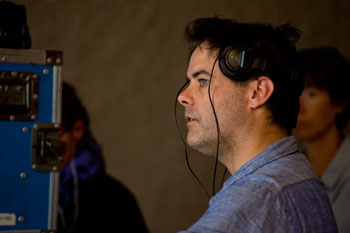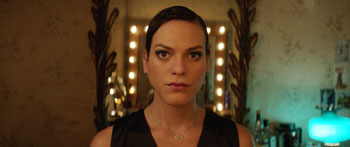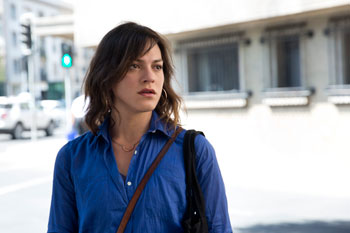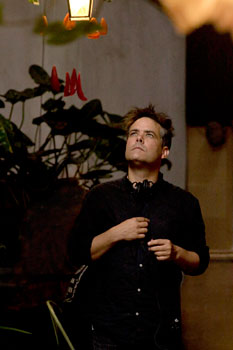Sebastián Lelio A Fantastic Woman Interview

Nominated - Best Motion Picture (Foreign Language) - 2018 Golden Globe Awards
Cast: Daniela Vega, Francisco Reyes, Luis Gnecco
Director: Sebastián Lelio
Genre: Drama
Rated: M
Running Time: 104 minutes
Synopsis: Marina and Orlando are in love and planning for the future.
Marina is a young waitress and aspiring singer. Orlando is 20 years older than her, and owns a printing company.
After celebrating Marina's birthday one evening, Orlando falls seriously ill. Marina rushes him to the emergency room, but he passes away just after arriving at the hospital.
Instead of being able to mourn her lover, suddenly Marina is treated with suspicion. The doctors and Orlando's family don't trust her. A woman detective investigates Marina to see if she was involved in his death. Orlando's ex-wife forbids her from attending the funeral. And to make matters worse, Orlando's son threatens to throw Marina out of the flat she shared with Orlando.
Marina is a trans woman and for most of Orlando's family, her sexual identity is an aberration, a perversion.
So Marina struggles for the right to be herself. She battles the very same forces that she has spent a lifetime fighting just to become the woman she is now – a complex, strong, forthright and fantastic woman.
A Fantastic Woman
Release Date: February 22nd, 2018
Director's Notes
I see A Fantastic Woman as a film of aesthetic splendor, narrative vigor, tension and emotion. Polytonal, multi-experiential, multi-emotional. It's a film that is both a celebration and examination of its main character: Marina Vidal. What will the viewers see when they see Marina? A woman, a man, or the sum of both? They will see a human being who constantly changes before their eyes, who flows, vibrates, and modifies herself. But what they are seeing isn't precisely what they are seeing, and this condition turns Marina into a vortex that attracts the viewer's fantasy and desire, inviting them to explore the limits of their own empathy.
-Sebastián Lelio
Interview with Sebastián Lelio
Question: How did you conceive A Fantastic Woman?
Sebastián Lelio: I like to think that the film, like Marina, its central character, is not afraid of pleasure and like her, has a striking and shiny surface. It tries to combine the narrative and the visual pleasure in games of appearances that want to captivate. A sort of Trojan horse loaded with humanity.
Question: What is your crusade, or your challenge, as the director of A Fantastic Woman?
Sebastián Lelio: I would like the viewer to end up intimately tied to Marina. So, regardless of his or her beliefs, values, or vision of the world, watching her so much on screen, the viewer ends up feeling like her. And from empathizing with her so much, the viewer wants to see her survive and prevail. Film invites us to feel like others, to experiment emotions that are often new to us, and these discoveries occur not within the films, but within the viewers themselves. Film prepares us for life and allows us to explore our spiritual elasticity. I would like the viewer to surrender him or herself to a challenging journey, and to do so with open arms. I would also like the viewer to feel that he or she has seen something beautiful. To feel that he or she was in contact with beauty.
 Question: What has the journey from Gloria to A Fantastic Woman been like?
Question: What has the journey from Gloria to A Fantastic Woman been like?
Sebastián Lelio: I feel that in some ways this film is a more complex construction than Gloria because it is several films at the same time. But in spite of the fact that A Fantastic Woman exists in a different cinematographic territory that operates far beyond realism, it has, just as with Gloria, a higher inclination towards questions than towards answers. At the same time, it examines and exalts a powerful female character, yet for several reasons, A FANTASTIC WOMAN is much more than a film about a woman.
 Question: At a moment in time in which the transgender issue is being discussed around the world, where on the map is A Fantastic Woman?
Question: At a moment in time in which the transgender issue is being discussed around the world, where on the map is A Fantastic Woman? Sebastián Lelio: I don't like judging while filming. I don't like looking down when filming, feeling that the characters are wrong or inferior to me. I need to situate myself in a place from which I can understand them, even the antagonists. When we began writing this film, the transgender issue hadn't exploded in popular culture like it did a year and half ago. Suddenly, the transgender figure moved from a misunderstood marginality to installing itself in a central place in our current collective imagery. I think that the film communes intimately with its character's identity. In Spanish, the word that is used to refer to sexual identity is the same one that is used to allude to narrative style: genre. In this sense, the film itself is 'trans-genre". It's a romance film, a ghost film, a fantasy film, a film about humiliation and revenge, a document of reality, a character study. The identity of the film itself fluctuates, it doesn't set, it doesn't stop, and it refuses to be reduced to one single thing. The fact that it can't be explained in any single way is perhaps one of A Fantastic Woman's most contemporary aspects.
A Fantastic Woman
Release Date: February 22nd, 2018
MORE
- Mission: Impossible Fallout
- Glenn Close The Wife
- Allison Chhorn Stanley's Mouth Interview
- Benicio Del Toro Sicario: Day of the Soldado
- Dame Judi Dench Tea With The Dames
- Sandra Bullock Ocean's 8
- Chris Pratt Jurassic World: Fallen Kingdom
- Claudia Sangiorgi Dalimore and Michelle Grace...
- Rachel McAdams Disobedience Interview
- Sebastián Lelio and Alessandro Nivola...
- Perri Cummings Trench Interview




